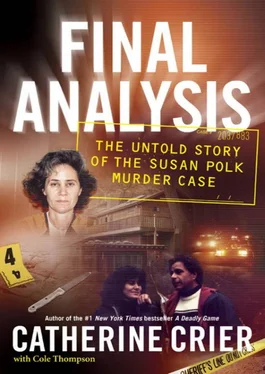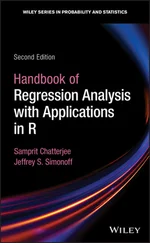It shouldn’t have been this way. In his mind, he believed he had “fixed” her at age sixteen and to think that her persistent problems stemmed from those residual issues was to admit his failings. For Felix to obtain a restraining order against his wife, for him to abandon his home for a hotel, would have been to admit the truth: Dr. Polk had lost his patient long ago. He’d lost her back in his office on Ashby Avenue. He’d lost her when he should have been helping her the most. He’d lost her the moment he laid a hand on her.
It was a reality too intimidating to confront, a failure too grand to realize. And so when all of his friends insisted that he move out, when all of his logic told him to leave the house, he could not, choosing instead to remain in the confines of the guest cottage with the door unlocked, waiting—perhaps even hoping—to find a way that he could heal Susan before it was too late.
Chapter Nineteen
BROKEN BONDS
On October 23, 2002, Contra Costa County Superior Court Judge Merle Eaton honored the prosecutor’s no-bail request and ordered Susan remanded to the West County Detention Facility in Richmond. In court, Judge Eaton agreed with Contra Costa County Assistant District Attorney Tom O’Connor’s claim that Susan was a flight risk. He pointed to statements she had made in the letter she wrote to Superior Court Judge William Kolin in September 2002, regarding Eli’s probation violation.
“In one part of the letter, the defendant clearly indicates she would sell her home and leave the area,” Judge Eaton stated in his ruling. “It was those statements that caused Eaton ‘great concern’ and prompted him to make the no-bail ruling,” he wrote.
Susan’s no-bail status meant that Gabriel would need to find another place to live. He was released to the custody of his eldest brother, Adam, after spending the night of October 14 speaking with detectives at the Martinez headquarters. While Adam was technically old enough to care for his minor sibling, he wanted to complete his college education. There was brief talk of Gabriel joining Adam at the frat house at UCLA in Los Angeles, but the authorities immediately rejected that plan.
Since leaving police headquarters, Gabriel had been staying at the home of a Lafayette couple, Marjorie and Dan Briner, who were the parents of Adam Polk’s close friend, Andy. When the couple learned of Gabriel’s situation, they immediately opened their home to the teen. The Briners had never actually met Gabriel or his parents, but they thought highly of Adam and wanted to help. Marjorie was a middle-school teacher and Dan worked in commercial real estate, and the pair lived in nearby Lafayette.
Gabriel’s stay was intended to be temporary, but as time passed, the Briners invited him to remain on a permanent basis. He fit in well with the family and was flourishing in their care. When he arrived, Marjorie noted that he was “the most angry boy I’ve ever met.” He wanted nothing to do with his mother, tearing up some of her letters and leaving them in shreds in the trash. At first, Marjorie taped them back together. But after Gabe threatened to leave if she continued to repair them, she just left the remaining letters in a pile unopened for him to read when he was ready.
Despite the initial setbacks, Gabriel was soon able to form a bond with the family, and the Briners were among the few family friends invited a few days after the funeral to accompany Gabe and his siblings—Adam, Eli, Andrew, and Jennifer—to their father’s cremation and the somber hike that followed. Felix once told Adam that he wanted to be cremated, like his father. Eric and the other children intended to honor that wish, deciding to pay homage to Felix’s love of the outdoors by releasing his ashes at the end of a lengthy trek to the top of Mount Tamalpais. Located just north of San Francisco’s Golden Gate Bridge, it was one of Felix’s favorite hiking spots with more than fifty miles of trails, towering redwoods and oaks, and a serpentine road to the top of the park’s summit. After the long walk, the siblings and the Briners released his ashes into the breeze as the dust of Felix hovered in the air, drifting down on the San Francisco Bay.
Initially, Susan had no objections to her son’s placement with the Briners and even seemed to be fairing well in jail. She sent out homemade holiday cards at Christmas time 2002, and in the months after her incarceration, she wrote furiously to her sons, receiving responses from Eli and Adam, but not from Gabriel. Instead, she learned how he was doing through letters from Dan and Marjorie.
In one letter, dated March 12, 2003, Dan praised Gabriel’s progress. “His studies are really quite good,” Dan wrote. “He is improving on his study skills, reluctantly, like most teenagers that I know and he is beginning to be willing to recognize those areas that he needs to work on.”
Keeping the imprisoned mother apprised of every detail, Dan informed Susan that her son was now a member of the De La Salle rugby team and the junior varsity football team and that he “was getting along well with our family.”
“We have had no problem with him breaking primary rules such as smoking, drinking, or significant defiance,” Dan noted. “And we communicate openly and frankly so that he knows he has both commitment and support. He continues to work with his counselor twice a week…. He is still not reading your letters. We always tell him when they arrive and we keep them unopened for him for a later time. We recognize that they are very important to him…. Gabe sees more and more that he has a lot of opportunity and a lot of potential and Marjorie and I think he will excel.”
These letters to Susan continued until July or August of 2003, when Susan and Marjorie Briner had a verbal confrontation over the telephone. The altercation, which came after months of angry letters and phone calls from Susan, prompted Marjorie to cut off all communication with Gabe’s mother. At first, the couple obliged Susan’s myriad requests, including shopping for Christmas and birthday gifts for her sons for which she promised to reimburse the couple. However, this arrangement soured after Susan raged at Marjorie for refusing to buy Adam a DVD that he insisted he didn’t want.
Susan’s pattern was to blow up, rant and rave, and then follow up with a kind letter as if the angry incident never took place. It was a difficult routine for a family that was just trying to help a young teenager get back on his feet, and by August of 2003, Marjorie Briner could not bear any more confrontations. In addition to her verbal abuse, Susan was now claiming the Briners were conspiring with others to rob the Polk estate, accusing the family of brainwashing her sons against her in order to get their hands on the family money.
This conspiracy theory was further complicated by the fact that Susan was convinced the Briners were in cahoots with Felix’s twin brother, John, and John’s attorney, Bud Mackenzie, who was representing John in the Polk estate proceedings. She even went so far as to blame the couple for pocketing Gabriel’s monthly social security check of twelve hundred dollars to spend on personal indulgences, a check that Gabe’s half sister, Jennifer, had arranged for him to receive after their father’s death.
In reality, Gabriel was turning over his check each month to help offset the couple’s expenses. Although they both held good jobs, the Briners were not rich. Dan Briner was hoping to teach Gabriel how to manage his finances, and in the early days, he was giving the teen a four hundred dollar monthly allowance, which he increased as the boy showed he could handle his own financial affairs.
The success that the family experienced with Gabriel eventually led them to take responsibility for Eli after he was released from Byron Boys’ Ranch in the summer of 2003. The arrangement did not last long, and Eli stayed just two weeks, claiming the couple tried to sour him on his mother.
Читать дальше











